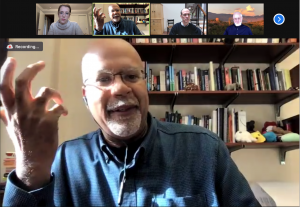This conversation was led by Paul Turner, Rachel Carson Professor of Ecology and Evolutionary Biology at Yale University, with additional discussion by Benjamin Chan, Research Scientist of Ecology and Evolutionary Biology at Yale, and clinical perspectives from Robert Woods, Assistant Professor in the Devision of Infectious Diseases at the University of Michigan Medical School.
One possible strategy to combat the antibiotic resistance crisis is a renewed approach to ‘phage therapy,’ where these administered viruses not only kill the target bacteria, but also predictably select for phage resistance that reduces virulence and/or increases antibiotic sensitivity (evolutionary trade-offs). By utilizing virulence factors as receptor binding sites, the phages exert selection for bacteria to evolve phage resistance by modifying (or losing) the virulence factor, potentially reducing bacterial pathogenicity. We present examples of phages that kill target bacteria while selecting for phage resistance that coincides with useful clinical traits, and compare in vitro data to phenotypic, genetic and metagenomics analyses of microbes isolated longitudinally from patient samples before, during and after emergency phage therapy treatments.



Resources discussed:
- Chan et al. 2018, “Phage treatment of an aortic graft infected with Pseudomonas aeruginosa”
- Burmeister et al. 2020, “Pleiotropy complicates a trade-off between phage resistance and antibiotic resistance”
- Gurney et al. 2020, “Phage steering of antibiotic-resistance evolution in the bacterial pathogen, Pseudomonas aeruginosa”

Comments are closed, but trackbacks and pingbacks are open.